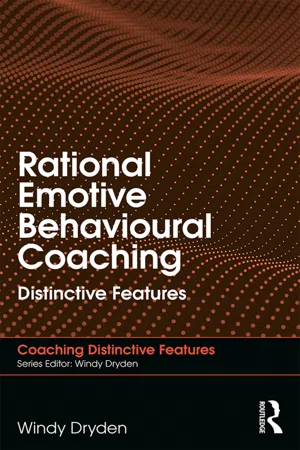![]()
![]()
1.1What is Rational Emotive Behavioural Coaching?
To understand Rational Emotive Behavioural Coaching (REBC) as an approach to coaching, imagine an umbrella, which is a construction of metal ribs and a canopy. REBC can be regarded as one of the metal ribs (the specific approaches) that support the single canopy of Cognitive–Behavioural Coaching (the broad coaching tradition). The purpose of this book (and the series of which the book is a part) is to outline the distinctive features of the approach in question. But why is the approach called Rational Emotive Behavioural Coaching?
1.1.1‘Rational’
As I will discuss shortly, coaching is essentially a way of helping people to pursue their development in one or more areas of life. The terms ‘rational’ and ‘irrational’ in REBC relate to the attitudes coachees hold about life’s events. So-called ‘rational’ attitudes encourage coachees to follow their development-based objectives. They are non-extreme and flexible in nature, they chime with reality and make sense and they tend to have healthy consequences. So-called ‘irrational’ attitudes, in contrast, impede coachees’ pursuit of their development-based objectives; they are extreme and rigid in nature, inconsistent with reality, don’t make sense and tend to have unhealthy consequences.
1.1.2‘Emotive’
Coachees obviously have emotions, and the term ‘emotive’ refers to the fact that these feelings can enhance or hinder the process of coaching. Provided they are not unhealthy (as in mania), positive emotions are generally conducive to the coaching process. Negative emotions (called ‘adversities’ in this book), which coachees generally experience about negative events, can be healthy or unhealthy (see Chapter 6). When coachees seek coaching for emotional problems, their negative emotions about adversities will almost certainly be unhealthy. In other words, they are prone to be fixed in their attitudes and therefore stuck and unable to deal constructively with their particular adversity. These unhealthy negative emotions (UNEs) are considered to originate from extreme, rigid attitudes in REBC theory. When, on the other hand, coachees’ negative emotions are healthy, they will be able to confront the adversity in question, process it properly and handle it constructively. These healthy negative emotions (HNEs) are considered to arise from non-extreme, flexible attitudes in REBC theory.
1.1.3‘Behavioural’
In REBC, the term ‘behaviour’ refers both to overt behaviour and to an urge to act that is not necessarily manifested by overt behaviour. The latter is called an ‘action tendency’. How coachees act is a key factor in establishing if and how they will achieve their development-based objectives in development-focused REBC and in determining whether they will find a solution to their practical problems in practical problem-focused REBC.
In the case of emotional problem-focused coaching, the model of behaviour represented by REBC serves as a parallel to its model of emotions in positing that rigid and extreme attitudes are likely to form the basis of behaviour that is mainly unconstructive and that flexible and non-extreme attitudes are likely to form the basis of behaviour that is mainly constructive. Behaviour based on rigid and extreme attitudes is associated with UNEs, while behaviour based on flexible and non-extreme attitudes is associated with HNEs.
1.2The scope of Rational Emotive Behavioural Coaching
Although as an approach to coaching REBC originates from the therapeutic approach of Rational Emotive Behaviour Therapy (REBT) (see Dryden, 2015; Ellis, 1994), it has a broader scope than REBT and focuses on two major areas.
1.2.1Focus 1: Development
REBC’s main area of focus is on pursuing a coachee’s development, In this case, while the person may be faring well in their life, they sense that they could be achieving more for themselves in many areas of their life and they therefore seek help from a coach to aid them. As you will see, the REB coach will assist them in selecting achievable and suitable goals, encourage them in developing action plans that are workable and then help them put these into practice.
1.2.2Focus 2: Problems
Although REBC’s main focus is on development, ‘coaching’ as a type of professional help maybe more acceptable to some people seeking help for their problems than ‘psychotherapy’ or ‘counselling’. These people may resist consulting a psychotherapist or counsellor because they consider that doing so might indicate that there was something wrong with them. In such cases, requesting help from a coach may not have the same negative connotations as requesting help from these other professionals.
Considering that people do seek help from coaches for their problems, my view on this issue is that REB coaches should be equipped to help their coachees with these problems, which are basically either practical or emotional, or both.1
1.2.2.1Practical problems
When coachees have practical problems, they may be confused or mixed up over a number of issues and need to establish a sense of clarity and order by talking their problems through with someone. They may be dissatisfied about the issue, but they are not necessarily emotionally disturbed about it. As I will consider in Chapter 4, the REB coach can most usefully help the person by encouraging them to stand back and adopt a new perspective on the issue at hand, thus gaining a greater understanding of its constituent parts that will help them to put into practice the appropriate solution to the problem at hand.
1.2.2.2Emotional problems
In the case of emotionally problematic issues, when an REB coach works with a coachee, the coach will draw upon REBT’s theory and practice. In this case, the difference concerns the kind of emotional problem that the REB coach deals...
